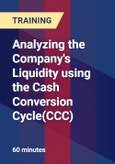Why Should You Attend:
What is the Cash Conversion Cycle? How do you calculate it? What does it really mean in regards to a company’s liquidity position?Attend this webinar and learn how the CPA should calculate and interpret the Cash Conversion Cycle formula to see its direct impact on the company’s liquidity. Included in the formula will be an assessment of acquiring inventory, collecting account receivables efficiently, and paying the account payables in a “judicious” manner.
Additionally, the webinar will cover inventory accounting “costing methods,” financing inventory, and controlling inventory costs. The effective collection of receivables will also be reviewed including negotiating “reasonable” terms. Furthermore, the timing of paying the payables will be explored including the impact of taking “discounts.” The concepts of the Cash Conversion Cycle will be illustrated through a case study.
Areas Covered in the Webinar:
- How the CPA should calculate and interpret the Cash Conversion Cycle formula
- Assessment of acquiring inventory
- Collecting account receivables efficiently
- Paying the account payables in a 'judicious' manner
- Inventory accounting 'costing methods'
- Financing inventory
- Controlling inventory costs
- Collection of receivables
- Negotiating 'reasonable' terms
- Timing of paying the payables
- Illustrations of the Cash Conversion Cycle
Who Will Benefit:
- CPAs
- CFO/controllers
- Financial managers
- Auditors
- Financial analysts and practitioners who provide accounting, tax or consulting services to businesses
Speaker
David L OsburnCourse Provider

David L Osburn,









